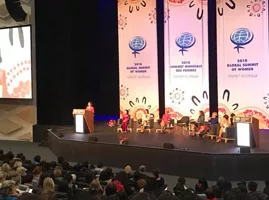 NAWBO National’s global mission is to engage in meaningful partnerships to promote women’s entrepreneurship all over the world. Recently, we have strengthened this commitment by inviting international delegations to NAWBO events and reciprocally sending our NAWBO leaders as global delegations to events outside the United States. There is no doubt that our members benefit from the connections they develop and the broader and deeper worldview they gain, which ultimately helps them as businesswomen and community leaders.
NAWBO National’s global mission is to engage in meaningful partnerships to promote women’s entrepreneurship all over the world. Recently, we have strengthened this commitment by inviting international delegations to NAWBO events and reciprocally sending our NAWBO leaders as global delegations to events outside the United States. There is no doubt that our members benefit from the connections they develop and the broader and deeper worldview they gain, which ultimately helps them as businesswomen and community leaders.
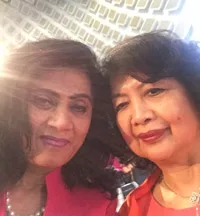 Most recently, NAWBO National Board member Shaila Rao Mistry of Jayco MMI and STEM Institute in California represented NAWBO at the 2018 Global Summit of Women in Sydney, Australia. Shaila was also a featured speaker in the “New Business Models For the 21st Century” panel presentation. The Global Summit of Women was conceived as the nexus at which all sectors—public, private and nonprofit—would come together under the common vision of dramatically expanding women’s economic opportunities globally through exchanges of working solutions and creative strategies forged by women leaders in different parts of the world. It is a business summit, whose “business” focus for more than 27 years now has been women’s advancement in the global economy.
Most recently, NAWBO National Board member Shaila Rao Mistry of Jayco MMI and STEM Institute in California represented NAWBO at the 2018 Global Summit of Women in Sydney, Australia. Shaila was also a featured speaker in the “New Business Models For the 21st Century” panel presentation. The Global Summit of Women was conceived as the nexus at which all sectors—public, private and nonprofit—would come together under the common vision of dramatically expanding women’s economic opportunities globally through exchanges of working solutions and creative strategies forged by women leaders in different parts of the world. It is a business summit, whose “business” focus for more than 27 years now has been women’s advancement in the global economy.
Here, we spoke with Shaila about the Summit experience:
Why did you want to participate this year?
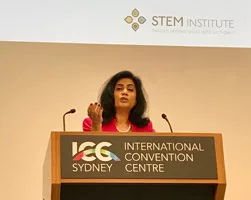 “My first contact with the Global Summit of Women was back when it was held in Seoul, Korea, and I was invited to speak. Since then, I have spoken on all five continents and am passionate about getting across the message of economic empowerment for women and advocating for human rights globally. There is so much work to be done, and I feel great synergy between STEM Institute and the admirable work of the Global Summit of Women.
“My first contact with the Global Summit of Women was back when it was held in Seoul, Korea, and I was invited to speak. Since then, I have spoken on all five continents and am passionate about getting across the message of economic empowerment for women and advocating for human rights globally. There is so much work to be done, and I feel great synergy between STEM Institute and the admirable work of the Global Summit of Women.
Last year, I attended the 2017 Global Entrepreneurship Summit and was very impressed by the tone and impact of their message; not to mention the high caliber of content and speakers and, of course, the international array of 1,250 delegates from 70 countries. I always marvel at how the Summit brings in presidents and prime ministers from so many countries. So when I was asked to represent NAWBO in Australia, it was a double delight to speak on issues that are close to my heart and simultaneously represent U.S. women business owners.
Women create value in whatever they do, so this year’s theme of ‘Women: Creating Economies of Shared Value’ was in perfect synergy with the work of STEM Institute, which also works on a platform of bringing together the four quadrants of private sector, public sector, nonprofits and academia to work toward this common goal. In this respect, we have worked with the private sector on ‘Investing in the Future.’ We have collaborated with academia on ‘Models of Social Impact.’ We are working with government to open doors of opportunity for small and diverse woman-owned businesses.”
Tell us about the panel you were part of and why the topic is so critical.
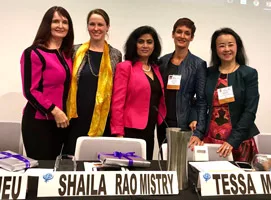 “I was featured for my innovative ways of doing business in last the 20-plus years. The president of the Global Summit of Women called to personally invite me to speak on the Issues Track: New Business Models for the 21st Century. She very astutely dived into the work of STEM Institute and our unique combination of business models we have created between Jayco MMI. The latter develops aerospace, security and medical devices, and STEM Institute, which has a legacy of innovative social impact work, develops organizations and grows leadership, including the next generation of STEM-trained millennials. I was asked to present the preamble that led to this combined business venture.
“I was featured for my innovative ways of doing business in last the 20-plus years. The president of the Global Summit of Women called to personally invite me to speak on the Issues Track: New Business Models for the 21st Century. She very astutely dived into the work of STEM Institute and our unique combination of business models we have created between Jayco MMI. The latter develops aerospace, security and medical devices, and STEM Institute, which has a legacy of innovative social impact work, develops organizations and grows leadership, including the next generation of STEM-trained millennials. I was asked to present the preamble that led to this combined business venture.
Jayco pioneered globalization in the late ‘90s, trading with reputable clients and vendors in Europe, Canada, India, China, Australia, Mexico, Singapore and more. This business model to entrepreneurship on a global scale is growing. I was asked to describe the many levels of social impact involvement and discuss our success, my vision and future expectations.
The core of my presentation discussed examples of the waves of transformation STEM Institute has been involved in. I described model pathways that each of us can engage in social impact. These include internet/information technology and the digital world, economic empowerment of women, infrastructure and capacity building with intent, influencing public policy and legislators and humanitarian work.
I also discussed the methodology of our success—comparing and contrasting measures of success in both enterprises, and how they differed from a traditional business enterprise. I spoke about what makes it work and what challenges I saw going forward. Of course, no presentation is complete without advice for other entrepreneurs who want to integrate social impact with their businesses. Mine is ‘to pick something close to your heart, start the work and join our business model.’
Approximately 300 delegates from business, government, academia and nonprofits attended the presentation. It was well received and a lively debate followed not only at the end of the presentation, but through the rest of the conference. Also part of the delegation was NAWBO Communications Director Becky Ragan and NAWBO member Lisa Brunet of DLZP Group, LLC in Texas.”
What was the top takeaway you hope women would receive who attended your presentation?
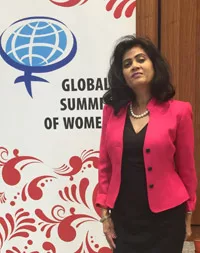 "Going to Australia required a tremendous amount of time away from my family and business and budget. I come from a family who believes in giving back, and as a young woman, I always questioned inequalities for women and was determined to do something about it. I went to the Summit to be inspired by others and to share the Jayco/STEM Institute success story and pathways we created for the waves of transformation in society.
"Going to Australia required a tremendous amount of time away from my family and business and budget. I come from a family who believes in giving back, and as a young woman, I always questioned inequalities for women and was determined to do something about it. I went to the Summit to be inspired by others and to share the Jayco/STEM Institute success story and pathways we created for the waves of transformation in society.
Business is critical to building sustainable societies and we need to do more. Profitable businesses are not the bad guy. After all, small businesses represent 50 percent of GDP and are owned by folks like you and I. I want women to find a place to connect and grow in their contributions. I want to engage millennials and show the power of innovation. Judging from the responses, I know we are going in the right direction. My mantra is, ‘Be the change you wish to see’ (Gandhi).”
You also attended the GES Summit in India earlier in the year—how did you benefit from that trip?
“I was invited by the U.S. State Department, as their delegation led by Ivanka Trump, to the Global Entrepreneurship Summit in Hyderabad, India. Eighteen hundred entrepreneurs of all sizes from 123 countries assembled. This was an undertaking of even greater magnitude because it was a joint collaboration between the two governments of India with the U.S. Prime Minister Narendhra Modhi officiating.
There was a tremendous selection process to carefully craft an assembly of women business owners, new innovation entities and millennials. Their innovative strategy was to highlight women as the future of growth. They provided a level playing field for all sizes of entrepreneurs to converse, engage millennials and match with angel investors.
So there were many lessons from this particular venture that would be particularly useful to our NAWBO mission and vision and will help our business owners grow and engage millennials. Our economic empowerment, both as an organization and as an economy, rests on our willingness and ability to engage small businesses, open doors to women-owned business, embrace diversity and engage millennials.”
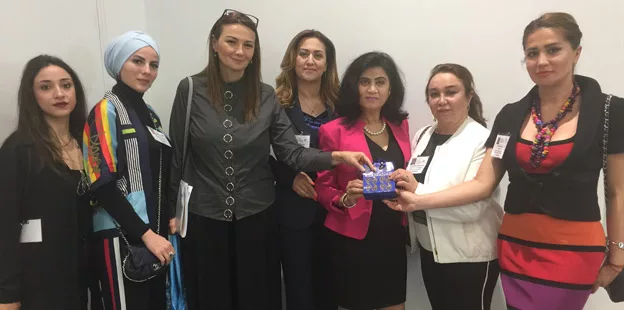
If you had one piece of advice to U.S. women entrepreneurs about taking advantage of global opportunities like these, what would it be and why?
“These days, most businesses are directly or indirectly global. Indeed, international trade may not be for everyone. Nonetheless, it is essential that we stay informed about the global economy and transactions. This adds the dimension that equips you to fully service your clients who are quite likely to have global ventures. Above all, do what fits in with your business model and is close to your heart.”

